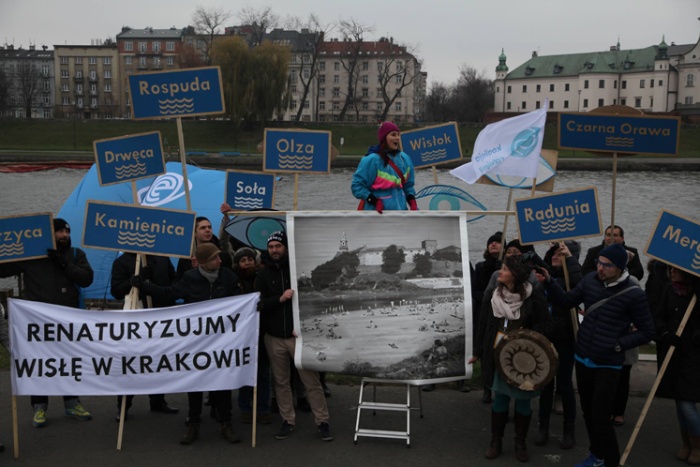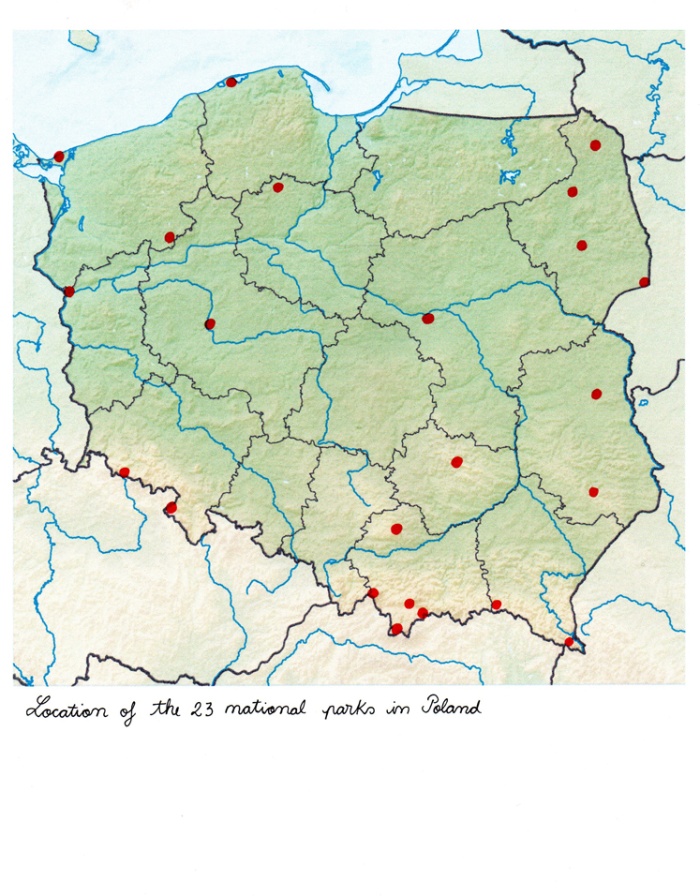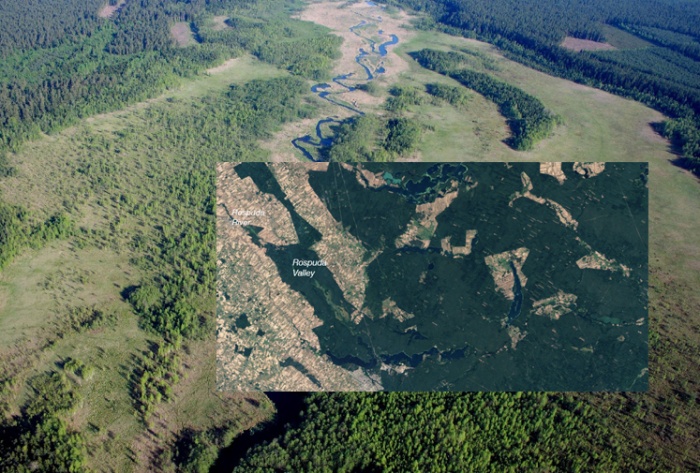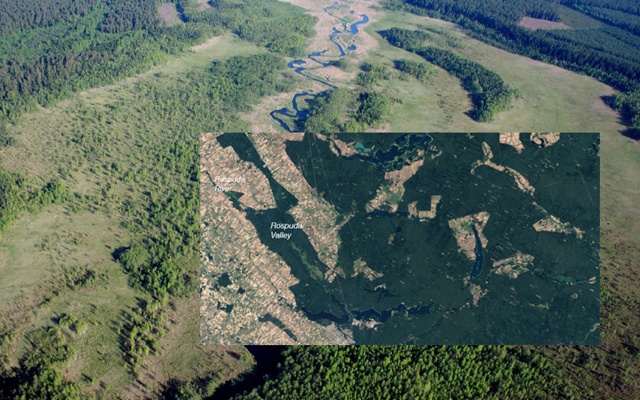At the point of shaking off the authority of “communism,” Poland had the opportunity and a vantage position on a global scale in the North to join the vanguard in the ecological protection and preservation of the natural environment. After three decades of neo-liberal “modernization” and anti-green politics promoted by neo-conservatives, it is becoming clearer and clearer that Poland is now trailing behind any progressive drive.
In 1989, on the brink of regime change, the situation was as follows. Intensive industrialization and the exploitation of natural resources, characteristic of real-socialist regimes – and to a certain extent understandable, since it had been motivated by the desire to overcome the industrial underdevelopment of the periphery countries – had had severe ecological consequences. One of the most significant was the shrugging off of the industrial pollution wrought on the air, water, and soil. Such was the result of the obvious limitations of a poor and backward country that had simultaneously undertaken intensive industrialization and ambitious social projects such as the mass construction of residential housing and the creation of a broadly conceived civilizational infrastructure in spheres spanning education, culture, entertainment, and leisure. There were no financial resources left for the protection of the environment. The scale of discharge of untreated wastewater flowing into inland waters as well as the dust emissions from industrial installations (Polish cities were among the most polluted in the world in terms of industrial emissions) was enormous and resulted in massive local environmental problems, such as rivers turning into sewers, acid rainfall, and the extinction of entire areas of forest.

Wodna Masa Krytyczna. Źródło: Facebook.
At the same time, the severity of this phenomenon gave rise to a growing social awareness and opposition. From its very inception, the Solidarity movement emphasized the issues of ecological threats and postulated counteraction. The 1980s were a period of increasing awareness of these issues, and the first actions of the “green” movements following the political transformation enjoyed considerable popular support and raised hopes for a permanent alliance between activists and ordinary people. There were numerous problems so acute and tangible that it was easy to drum up support in a quest for solutions.
Moreover, in 1989, Poland possessed significant ecological advantages. Paradoxically, some of these stemmed from the same factor that had resulted in “dirty” industry – underdevelopment. The limited opportunities and means of development of this peripheral country forced the abandonment of some of the harmful tendencies familiar from Western countries. Let us enumerate only the most significant strengths and weaknesses.
In the first place, the absence of large-scale public and business intervention and investment, notably manifest in the case of rivers, the majority of which – unlike their counterparts in the West – remained unregulated and un-dammed, made possible the survival of unique ecosystems and ecological corridors.
Moreover, before 1989, there had been in Poland little pressure for development related to residential or investment housing; this helped avoid the typical Western urban sprawl, with its resultant proliferation of transport routes and residential infrastructure, and the exploitation of yet more natural areas.
The development of individual motorization was commensurately smaller, due both to the country’s underdevelopment and deliberate, ideologically motivated, political decisions together with the centralization of the socialized economy and its associated traffic flows. There were few privately owned cars but the railway and bus network was very well developed, enabling convenient and cheap travel. This meant that there was no huge ecological pressure arising from exhaust emissions, the construction of new roads and car parks or the use of non-renewable raw materials. Consequently, there was little interference with the ecosystem, compared to the countries on the other side of the Iron Curtain. One of the greatest ecological challenges has been the fragmentation of biotopes caused by motorways and road traffic that present barriers which are impassable for many species.
Another characteristic of the system was the paradox of an economic system that was centralized in terms of political decisions and ownership structure yet simultaneously decentralized at the level of production. This manifested itself in the existence of a dense network – almost as dense as that of the West in the era of entrepreneurial manufacture – of production of many goods. This in turn eliminated the need to transport products over long distances, by the same token reducing the negative impact on the environment.
Another phenomenon was the modest demand for everyday goods occasioned by the shortage of finance, resources, and investment opportunities. Preceding by decades the current drive for recycling, reuse, and zero waste, the economy of the People’s Republic of Poland relied on very modest packaging, the mass re-use of wrapping materials, robust demand for secondary raw materials – including those considered “uneconomical” in the market economies, as well as a minimal use of plastic, which for consumer and packaging purposes was replaced by paper, glass, and metal.
Apart from farming co-operatives, Polish farming was structured around small, dispersed, family plots, with all the advantages that entailed – such as very low use of artificial fertilizers, fuels and other resources, crop diversity and acquiescence in many environment-friendly solutions such as crop rotation, hedges, and protective tree screens between fields, and so on. Moreover, there was sound spatial planning and an advanced program of protective zoning. It was during the era of the People’s Republic that almost all the national parks were created, along with nature reserves and landscape parks. All these factors combined to create a coherent, efficient modern system of environmental protection both as regards a wild, unstructured natural environment and local green zones such as municipal green areas. The acute problems of industrial pollution emissions, local examples of over-exploitation or over-industrialization, and the unresolved problem of sewage management did not change the fact that in 1989 Poland had had an excellent start towards eco-development – not merely hypothetical, but with tangible green shoots showing. Suffice it to recall the considerable support for ecological initiatives at the time, e.g. the protests against the construction of a dam in Czorsztyn, the enlargement of the protected area in the Białowieża Primaeval Forest in 1995, the thriving manifold grassroots green movements that manifested themselves in various contexts, the respect in which ecologists were held by the early post-1989 governments (let’s note the appointment of the renowned ecologist Professor Stefan Kozłowski as Minister of Environmental Protection in Jan Olszewski’s government), and, last but not least, a fashion for environmental protection, accompanied by the development of environmental education. Poland was all set to become “green.”

Parki Narodowe w Polsce (mapa).

Stop wycince | Strajk dla ziemi, akryl na wydruku na płycie pilśniowej, 21 x 25 cm. Arek Pasożyt / Parasite, 2019. Dzięki uprzejmości artysty.
History would, however, take a different course. Soon the country began to emulate the worst possible blueprints, albeit that some improvements also continued to be made. Today, we can speak of the great improvement in the many bodies of inland water thanks to the improvement of the sewage system. Industrial emissions lessened considerably, although much of this trend was due to the neo-liberal policy of de-industrialization rather than any green reforms. Nevertheless, ecological awareness percolated into forestry. On balance, however, the outcome seems negative. It is useful to look at the most significant negative trends.
First of all, Poland opted for a neo-liberal economy and a vision of emulating the West, including adopting solutions which are now being abandoned there. The model meant commercialization and a market economy for many if not all biological resources and a consumerist approach in relation to them and to the rules governing public life: what counts is only what is profitable; anything that stands in the way of a narrowly defined co-efficient of development, for instance an increase of GDP, is anathema.
Commercialization, privatization, profitability, and individualization brought Poland a decline in public transport and a deluge of individual motorization. As a result, entire swathes of the country were cut off from public transport or at least from its convenient forms. Motorization was thus enforced; with it came ecological repercussions such snowballing pollution, rapid consumption of petroleum-based fuels, smog, noise, fragmentation of natural areas by road infrastructure, etc. – and it was also enforced. This trend had the backing of practically all significant political forces and was cheered on by neo-liberal supporters of “modernity,” with the liberal media as its long-standing fans. It is only recently that reflection on the negative social and ecological effects of the development of individual motorization has achieved public currency.
It was a similar story with spatial planning. In fact, it became a farce. In Poland, you could build anything, anywhere – as long as you had the appropriate funds at your disposal (no matter if it was “dirty” money or the process relied on bribes); sometimes you did not even need capital as many construction investments became accessible to the lower-middle classes. Developers erected housing estates at the expense of parks and city green belts. Towns and cities expanded considerably, because of individual house building, and the resulting urban sprawl took place without any corresponding increase in population. This was all taking place at the expense of greenfield land and landscape, as well as the habitats of flora and fauna. Apart from the obvious consequences, this brought about also more subtle effects such as a growth in road traffic (suburban dwellers had to commute to city centers) and increased air pollution, since scattered house development without access to a district heating network made the individual heating of houses necessary.
It was just the same with the packaging and waste industries. Rather than learn from the experiences of countries that had attempted to reduce the deluge of rubbish and throwaway packaging and introduce recycling, Poland chose the worst of all possible worlds. The frugal industry of old and contemporary systems of recycling were presented as old-fashioned and behind the times. The cult of the disposable rules. The few, and not very effective, solutions, that do exist transfer from producers and companies profiting from this model to individual consumers the effort and costs entailed in trying to save the environment. No solution has ever been successfully implemented either in the first stage of the process – such as curtailing disposable packaging – or in its final stage (through effective reclaiming of resources), the only exception being those raw materials that can be recycled for profit.
Negative changes have also occurred in agriculture and food distribution. There has been a concentration of farmland ownership and production, typical of capitalism, additionally supported by the EU’s Common Agricultural Policy, which for years has been accused by small farmers and local agro-ecological circles in Western Europe of favoring large-scale crop producers, at the cost of the social collapse of the countryside and the devastation of ecosystems. In Poland, this has taken the form of a rapid reduction in the number of individual farms and the concentration and industrialization of agriculture – there has been an expansion of large-crop, monoculture farming, which relies on the generous use of fertilizers, pesticides, and other substances that totally disregard any consideration of reducing short-term productivity in favor of maintaining the long-term condition and efficiency of ecosystems.
Such solutions went hand in hand with neo-liberalism in other spheres of public life. There was growing social inequality, increasing poverty, and social exclusion, exploitation, and precarious terms of employment. The government had abdicated all responsibility for society or legal regulation, acquiescing in the mass abuse of employment law and the lack of available social housing affordable to those on the average wage. The result was a pauperization of society, a lack of prospects, and a passing of the buck of survival onto the shoulders of individuals and families. Under such circumstances, many ecological postulates seemed an indulgence or social sadism – for how else in an impoverished society could one view injunctions to limit consumption or to opt for more expensive “green” products? Apart from individual efforts, in post-regime change Poland there was no public forum for collective pro-environment action. On the contrary, there was encouragement for quite opposite developments. The previously mentioned increased number of private vehicles on the roads, which was a direct result of the reduction in public transport, was just one of many such trends. For example, for many years the Polish state and its institutions took no interest in the heating predicament of individual house owners, nor in the old tenement apartment blocks and the financial resources of their residents. It is only recently that any thought has been given to how and with which fuels the impecunious classes heat their homes or by what means those who live beyond the reach of district-heating networks manage or to the social and ecological consequences of using the lowest-quality fuels and opting for the cheapest solutions. In any case, any such reflection usually leads to the conclusion that such users are primitive and backward and there is no good reason why they use the smoke-generating fuels, the implication being that they are thoughtless or plain malicious. The state displayed a similar lack of policy in failing to oppose the invasion of large-scale discount supermarkets that contributed to the demise of many local channels of distribution of food produced locally and on a small scale, whether the case was the crisis of local market places, or the domination of retail trade by mass chain suppliers, combined with the reduction of outlets for local producers.
Under such circumstances it was difficult to convince the majority of the public that ecology mattered and that it was something that “ordinary people” could practice to their advantage. And worse than that, in due course there appeared a chasm between environmental activists and a large portion of society. On the one hand, the ecological movement was evolving towards a specialist-based culture and elitism, on the other its very organizational structure created barriers. The movement, financed by grants – usually oriented towards themes that were fashionable or favored by the benefactors rather than those based on social need – resulted in the activists being perceived as ivory-tower “professionals,” detached from the concerns of the social masses.
There was a similar pattern in the relationship between ecologists and the middle class, the latter cultivated by the neo-liberal elites and the media in the cult of private ownership, individual success, consumerism, and narrow indicators of development, such as GDP or investment, without taking notice of a broader spectrum of social and market attitudes, let alone their ecological consequences. The more motorization, wasteful consumption, and “investment” in everything there was, the better it was supposed to be and the more proof of being modern. Everything else was presented as regressive; all barriers and public policies were referred to as relics of socialism and impractical bureaucracy. Economic liberals and the media put the middle classes off ecologists. Before (neo-) conservative right-wing circles first placed them in their sights, it was the liberal circles that were at the forefront of the offensive. The terms “eco-terrorists,” “opponents of development,” or “eco-fanatics” were the order of the day for people, groups, and actions criticizing the vulgar development discourse (the cult of investment, concrete, GDP), disregard for the interests of the environment or nature, imitation of long discredited and already abandoned Western consumption patterns, or interference in the ecosystem.
It became more and more difficult to build bridges between activists and society. The increasingly technocratic, insular specialist language of some of the activists did not help, nor did the fact that they were implementing ideas and strategies that had evolved in distant countries, and were copying them wholesale in a different reality. At times, social mobilization took place and alliances formed that transcended divisions, providing social support even for radical ecological actions (such as the blockade of the construction of a motorway through the protected landscape around St. Anne’s Mountain). However, in time, they too became embroiled in current political interests and power struggles. Such actions as opposition to the plans to destroy the Rospuda Valley, cut down the Białowieża Primaeval Forest or to the “Lex Szyszko” – as the opposition dubbed the infamous, so-called act passed by the Sejm for the “protection of the environment” by the, ironically, then Minister of Environment permitting considerable liberalization of felling trees on private land – are undoubtedly justified, but they are part of a sharp political division and are perceived in those terms.

Dolina Rospudy i rzeka Rospuda. Na podstawie zdjęć Piotra Fiedorowicza, 2007. Źródło.
Ecology is thus increasingly associated with liberals, who have masterminded a system perceived by the majority as unjust. In turn, right-wing circles, which used to emphasize their anti-green attitudes much less, are today eager to position themselves in the same role that the liberal camp had once played, with a few exceptions: presenting pro-environment activity as anti-progressive, as anti-progress affirmation that cares more about “little frogs and flowers” than “the good of mankind.” Such rhetoric falls on fertile ground that has been prepared for years by liberal “modernizers.” Of course, the right-wing passes over such attacks by liberals, attempting to present ecologists as part of an “anti-Polish” lobby that supports barriers to “native development” and anti-social development. Unwittingly, some ecologist circles – who are either ideologically and personally close to Polish liberals or who avail themselves of most unfortunate rhetoric – aid and abet such a right-wing stance.
A perfect example of this is the current debate around combating smog or the necessity of abandoning the coal industry because of global climatic problems. Instead of accepting new solutions and offers of tangible, concrete support for large parts of society, proposing a “green New Deal,” as the left-wing American Democrats have done, the knee-jerk reaction of Polish ecologists is to join in the smear campaign against Polish miners and the coal basin together with its residents – what is left of the country’s industrial heart, as well as those impecunious Poles for whom coal is the only affordable and logistically available fuel. Let us not forget that for many years the subsidy program for renewable energy sources was de facto a program for the middle class: the need for substantial financial input from those receiving the subsidy as well as the other costs involved meant that the majority of the less affluent had almost no access to such technology.
The gap between ecology and the “working class” appears to be increasing. Right-wing propaganda falls on the fertile ground of aroused consumer appetites, stimulated by living standards improved thanks to the revival of the labor market and a wider social offer than in the past. All this is happening after decades of persuasion by the liberal media that while incidental ecology (the protection of specific areas) is legitimate, we should not “go over the top” with a comprehensive reduction of pressure on the ecosystem, if this were to harm narrowly understood, and viewed with a technocratic slant, “economic development.” To the visions of the past, the new governments have added a fresh one: that, having been brought to its knees economically, the country must now pick itself up; all restrictions and barriers are therefore a folly, excessively cautious or indeed a deliberate undermining of development – this time round – “national.”
The right-wing in power is doing what many governments and political factions have done before all over the world, when they were determined to bring about internal development while retaining a, variously conceived and motivated, distance vis-à-vis the might of global capital. The go-to solution has tended to be simple and within easy reach of economic pariah states: the exploitation of raw materials, profiting from turning up the pressure on biological resources. Any more sophisticated and advanced solutions are expensive and in most cases earmarked for the countries of the capitalist core.

Ropa naftowa. Zbiory Muzeum Geologicznego w Warszawie.
Care for the environment, besides many laudable endeavors, mostly takes the form of fashions and lifestyle choices that are appropriated by commercial interests and marketing strategies; the emphasis tends to be on the least important aspects, while the crucial problems, with the widest implications, are ignored. Many such efforts are time-consuming and require additional financing or an exceptional familiarity with cultural codes. These phenomena have been profiled in such a way that – popular as they are in big cities and within middle-class information bubbles – they are accompanied by surprise at, disapproval for, or a lack of comprehension in the less-privileged social groups.
An alternative movement that is politically responsible and ethically sound cannot opt for either looking after individuals, the nation, and the growth of the GDP, even at the expense of the devastation of the natural environment in the country and contributing to the escalation of ecological problems globally, or else for a “green revolution” that will be brought about by elitist moralizing and a quasi-racist portrayal of “ecological dimwits,” and at the expense of entire social groups, professional groups, and regions, usually the most vulnerable. Protection of the environment and nature is a raison d’être also for “ordinary” people, and both the Polish and global ecosystems need allies also – or perhaps especially – among the majority of society. The ecology of the future will be egalitarian, pro-society, and inclusive, and it will place the costs of any transformation – for example, in the energy-related sphere – on those who have benefited the most from the exploitation of resources to date. There is no alternative, if the outcome is to transcend the elites and prove effective.
Translated from Polish by Anda MacBride
BIO
Remigiusz Okraska is the editor-in-chief of the magazine Nowy Obywatel [New Citizen]. For many years he has been involved in the ecology movement both as an activist and editor of a magazine covering protection of the environment, and is also as an editor of books on ecology. He popularizes pro-social and anti-liberal ideas and promotes the prioritizing of the common good, also biological, above political divisions, albeit ideologically he is closer to the left than to the right.



